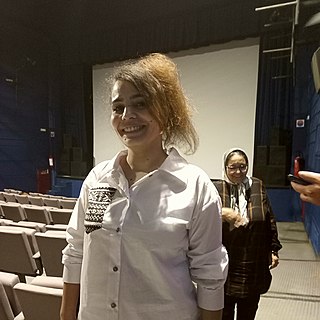
François Ozon is a French film director and screenwriter.
Lucía Sánchez is a Spanish-born French actress. She started her acting career in 1996 with Une robe d'été(A Summer Dress) directed by François Ozon.
Léa Pool C.M. is a Canadian and Swiss filmmaker who taught film at the Université du Québec à Montréal. She has directed several documentaries and feature films, many of which have won significant awards including the Prize of the Ecumenical Jury, and she was the first woman to win the prize for Best Film at the Quebec Cinema Awards. Pool's films often opposed stereotypes and refused to focus on heterosexual relations, preferring individuality.
The Institut des hautes études cinématographiques is a French film school, founded during World War II under the leadership of Marcel L'Herbier who was its president from 1944 to 1969. IDHEC offered training for directors and producers, cameramen, sound technicians, editors, art directors and costume designers. It became highly influential, and many prominent film-makers received their training there including Paulo Rocha, Louis Malle, Alain Resnais, Jean-Louis Trintignant, Claire Denis, Peter Lilienthal, Volker Schlöndorff, Andrzej Żuławski, René Vautier, Andre Weinfeld, Mostafa Derkaoui, Jean-Jacques Annaud, Claude Sautet, Nelson Pereira dos Santos, Patrice Leconte, Costa Gavras, Theo Angelopoulos, Jesús Franco, Omar Amiralay, Rithy Panh, Arnaud Desplechin, Claude Miller, Alfonso Gumucio Dagron Christopher Miles and Pascale Ferran.

The Filmakademie Baden-Wuerttemberg was founded in 1991 as a publicly funded film school in Ludwigsburg, Baden-Württemberg, Germany. The Filmakademie is one of the most internationally renowned film schools. One of its major distinguishing characteristics is the close collaboration with three other educational institutions on one campus: the Filmakademie's acclaimed Animationsinstitut ; the Atelier Ludwigsburg-Paris, an inter-university master-class on European film production and distribution hosted at the Filmakademie and in cooperation with notable French film school La Fémis in Paris and the National Film and Television School in London; and the neighbouring Academy of Performing Arts.

Bruno Delbonnel, ASC, AFC, is a French cinematographer, known for works from a number of high-profile directors, including Jean-Pierre Jeunet, Tim Burton, the Coen brothers, Joe Wright and Wes Anderson.
The École supérieure de réalisation audiovisuelle is a French private film school which specialises in the training of cinema, television, photography, sound engineering and digital art through the DESRA diploma, the DESTS and the DESFA.

Catherine Mouchet is a French actress.
Marina de Van is a French film director, screenwriter and actress. Her film, Don't Look Back, was screened out of competition at the 2009 Cannes Film Festival.

Kim Nguyen is a Canadian film director and screenwriter, best known for his 2012 film War Witch (Rebelle) which received numerous honours including an Academy Awards nomination for Best Foreign Language Film.
Pascale Ferran is a French film director and screenwriter. In 2007, her film Lady Chatterley won five César Awards including Best Film, Best Cinematography and Best Adaptation. Her 2014 film Bird People was selected to compete in the Un Certain Regard section at the 2014 Cannes Film Festival. Ferran also wrote the screenplay for The Red Turtle, an animated film by Michael Dudok de Wit, that competed in the Hawaii International Film Festival on 12 November 2016.

Thomas Cailley is a French screenwriter and film director. In 2014, he made his feature directorial debut with Love at First Fight, which won three César Awards including Best First Feature Film. In 2023 he made his second movie The Animal Kingdom.
Laurent Micheli is a Belgian film and stage director, writer and actor.

César Díaz is a Belgian-Guatemalan film director, screenwriter and editor.
Wandering: A Rohingya Story is a Canadian documentary film, directed by Mélanie Carrier and Olivier Higgins and released in 2020. The film is a portrait of the Kutupalong refugee camp in Bangladesh, which houses a large number of refugees from the Rohingya conflict in Myanmar.

Bouchra Ijork is a Moroccan filmmaker, screenwriter, dramatist and actress. She studied dramatic arts in Morocco, graduating from the ISADAC in 1998. She then had a brief stint playing a few roles in theater and television. In 2003, she attended the summer university programme at La Fémis in Paris.

Asmae El Moudir is a Moroccan film director, screenwriter and producer. She gained great recognition and national and international fame through her successful documentary The Mother of All Lies, for which she also won several awards.

Coralie Fargeat is a French film director and screenwriter. She gained international recognition with her 2017 debut feature film Revenge, for which she received awards from several independent film festivals. This was followed by her second feature, The Substance (2024), a satirical body horror film starring Demi Moore, screened in the main competition at the 2024 Cannes Film Festival, where Fargeat won the Best Screenplay award.

Raphaël Quenard is a French actor. After starring in small-scale short films and television productions as well as a variety of supporting film roles, Quenard earned acclaim for his breakthrough performances in Junkyard Dog (2023) and Yannick (2023). He received 3 nominations at the 49th César Awards, including Best Actor for Yannick, and won Best Male Revelation for Junkyard Dog.

Estelle Faye began her career as a French actor and screenwriter. Since 2009 she has been best known as a science fiction and fantasy author, where her novels and short stories have won several awards.














